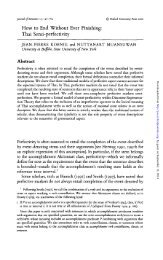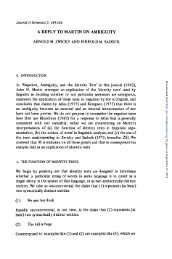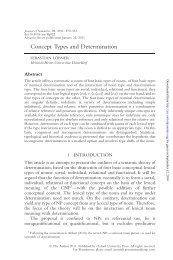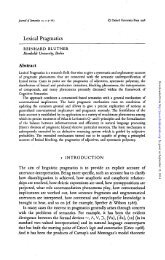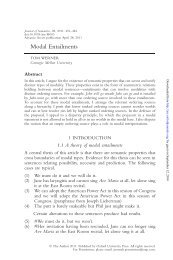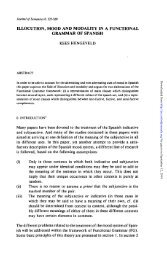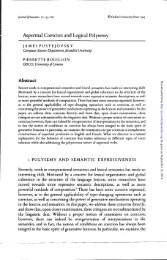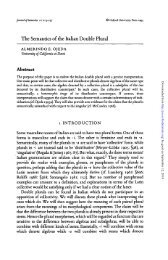Exclusive Company: Only and the Dynamics of Vertical Inference ...
Exclusive Company: Only and the Dynamics of Vertical Inference ...
Exclusive Company: Only and the Dynamics of Vertical Inference ...
You also want an ePaper? Increase the reach of your titles
YUMPU automatically turns print PDFs into web optimized ePapers that Google loves.
18 <strong>Only</strong> <strong>and</strong> <strong>the</strong> <strong>Dynamics</strong> <strong>of</strong> <strong>Vertical</strong> <strong>Inference</strong><br />
(43) a. <strong>Only</strong> WHEN I'M DEPRESSED do I ever eat any meat.<br />
b. *<strong>Only</strong> when I'm EVER DEPRESSED ABOUT ANYTHING do I eat meat.<br />
(44) a. He only bo<strong>the</strong>red to write WHEN HE NEEDED MONEY.<br />
a'. *He only BOTHERED TO WRITE, [i.e. he never called]<br />
a". <strong>Only</strong> WHEN HE NEEDED MONEY did he bo<strong>the</strong>r to write.<br />
b. You only lift a finger to help WHEN YOU WANT SOMETHING.<br />
b'. *You only LIFT A FINGER TO HELP.<br />
b". <strong>Only</strong> WHEN YOU WANT SOMETHING do you lift a finger to help.<br />
(45) a. The only one who said a word was CHRIS.<br />
b. # Chris only SAID A WORD (literal only; no'NPI idiom'reading)<br />
The contexts in which NPIs are acceptable do indeed license downward<br />
inferences in <strong>the</strong> Burley-Ladusaw sense—if we ignore existential import. 24<br />
Thus if I eat meat only when I'm depressed, <strong>the</strong>n it follows that in particular I<br />
eat pork (if I eat it at all) only when I'm depressed, but not that I eat meat only<br />
when I'm depressed about linguistics.<br />
Crucially, <strong>the</strong> argument <strong>of</strong> only that corresponds to <strong>the</strong> restrictor <strong>of</strong> a universal<br />
is a downward, superior-to-inferior-inference licensing, <strong>and</strong> NPIfriendly<br />
environment, regardless <strong>of</strong> its syntactic position. 25 And regardless <strong>of</strong> its<br />
morphology as well; thus, in (46b), where A is a singleton set, <strong>the</strong> relevant B<br />
position surfaces not as a st<strong>and</strong>ard restrictor-<strong>of</strong>-universal but is instead<br />
introduced by <strong>the</strong> determiner <strong>the</strong> only, which semantically amounts to <strong>the</strong><br />
converse <strong>of</strong> adverbial only:<br />
(46) a. <strong>Only</strong> As are Bs ~ All Bs are As<br />
b. <strong>Only</strong> A (Bs/is a B) ~ The only {B/B'er} is A<br />
As expected, NPIs are licenced in this context, but not just any NPI. 26<br />
In <strong>the</strong> context <strong>of</strong> (47), we find pronominal all <strong>and</strong> <strong>the</strong> only thing occurring<br />
interchangeably as heads <strong>of</strong> an NPI-hosting relative clause. 27<br />
(47) a. The only thing he ever does anymore is complain,<br />
b. All he ever does anymore is complain.<br />
Downloaded from http://jos.oxfordjournals.org/ by guest on September 12, 2014<br />
According to <strong>the</strong> line pursued here, <strong>the</strong> relation between an only predication<br />
<strong>and</strong> its prejacent—treated variously over <strong>the</strong> centuries as an entailment, a<br />
presupposition, a conventional or conversational implicature, <strong>and</strong> a Geachian<br />
ghost—is reconstructed as an indirect deduction from an existential premise.<br />
The linguistic correlates <strong>of</strong> downward entailment can be attributed to <strong>the</strong><br />
convertibility <strong>of</strong> only predications <strong>and</strong> <strong>the</strong> corresponding universals, each<br />
downward-inferential in <strong>the</strong> corresponding (restrictor) argument.<br />
But while conversion is always possible, <strong>the</strong> strongest case for only phrases<br />
defining strict downward inferential patterns are those where only takes<br />
common noun or adverbial focus. De Mey (1991: 102-4) points to <strong>the</strong> crucial



